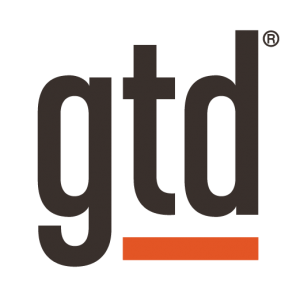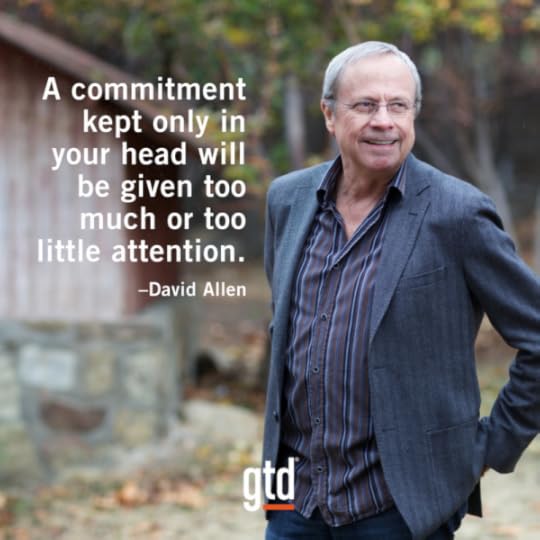David Allen's Blog, page 44
November 17, 2017
Episode #35 – The Case for Capturing
Listen to an engaging presentation David Allen gave on the case for capturing. In it, David explores the concepts of psychic RAM, society’s move into knowledge work, and the freedom we feel as we begin to implement the GTD methodology.
Listen Now
Subscribe or Download
November 3, 2017
Work/Life Balance
There’s not really work/life balance, there’s just balance. I mean, work is anything you want to get done, right? It doesn’t have to be pejorative. Having a good vacation can be work. Just think of the affirmation: Wow, this really works! Is that a bad thing?

There’s a lot of stuff we have to do that’s not glamorous. What you should be after, instead of some arbitrary boundary between work and home life, is a balance that you define for yourself. And that starts with values. Why do you have the things you have? Why are these important? When you ask these questions, the end game is in focus and the rest of your thoughts—work or otherwise—serve that end. But you need to be in the moment and you need to write down your thoughts as they hit you.
A lot of folks suffer from what I call the “latest and loudest.” These are the distractions that seem so important in the moment, but that don’t really serve your values or further your end game. Write what you think your values are so you can interpret them and take appropriate action. Ask yourself: Do I feel comfortable with the actions I’m taking in the moment? Or are they driven by external influences?
–David Allen
October 20, 2017
Are You Micromanaging Your Mind?
One of the greatest traps in growing a business is also a pitfall for self-management: If you don’t trust your system, you can’t let go of operational details  and you’ll limit your ability to create at a bigger level.
and you’ll limit your ability to create at a bigger level.
Many successful entrepreneurs I have worked with over the years could be characterized (and have been, by their employees and friends) as “highly creative control freaks.” It’s understandable, because usually it takes that kind of strong, directed energy to create a business, to make something out of nothing. Much like a parent will go to superhuman lengths to protect its vulnerable offspring, someone who gives birth to an enterprise almost of necessity must have skin as thick as an elephant’s and the aggressive/defensive capacity of a samurai warrior. It takes tremendous focus, determination, and, yes, a certain lack of sensitivity, to create something new and get it to stick around in this world.
That protectionism can, of course, become their undoing. In order to continue in their visionary capacity to grow and expand, they must mature not only their team and their systems but themselves as well, to prevent the strangulation of micromanagement. They have to trust. But trust is not something you can just do because you should. I suppose you can develop a greater sense of overall optimism about life, but you don’t merely learn to trust—you learn to build trust. And you do that by creating a system and working it, so you can let go at that lower functional level, without letting go of the bigger picture of what you’re trying to accomplish.
A beginner at the wheel of a car will have jerky, small movements. They are maintaining control, just at small increments of focus. Only as they learn to trust the car’s responsiveness can they let go on that level, extend their horizon, and cruise at higher speeds more easily.
Similarly, if you don’t fully trust your personal systems, you are likely to be dedicating inappropriate and unnecessary mental attention to details and content, often with a resultant negative emotional component. You’ll feel pulled, overwhelmed, and often like you’re close to losing control.
But you can’t trust your system until it’s trust-worthy. When is that? When you know you have captured all your commitments, clarified what you’re intending to do about them, decided the actions you need to take about them, and have parked reminders of those actions in places that you know you’ll look, where and when you need to.
Entrepreneurs have to break out of their comfort zone of operational control and let go, getting good people in the right places, accountable for the right things and monitored appropriately. Similarly, to keep a clear head focused creatively at the right things, you must have all the right things in your personal system and the behaviors to look at them at the right time. Cognitive science has now validated that if you try to keep more than four things in your mind at once, you’ll lose objectivity about their relationships with each other and denigrate your performance. Less important things will bother you more than they should, and you won’t give the tactical and strategic stuff the objective attention it deserves. And if some part of you knows that you don’t have everything captured and organized in the right place, your brain simply won’t let go of some attention to unseen details. You’ll find yourself still to some degree at the mercy of the latest and loudest. It’s the price paid for staying in the comfort zone of keeping control of it all in your head.
When people begin to implement the Getting Things Done® methodology, they initially experience a rush of energy and creativity, while feeling more relaxed at the same time. But those positive experiences can slip away quickly without the confidence that the content of their systems is complete and current (the inventory of which could have been changed and expanded hugely with the last phone call).
People have often said, “Gee, I have everything captured in the system, but my mind is still worrying and reminding me about this and that.” My question is, “How long have you been working your system?” Usually they have only recently set it up. That won’t be sufficient to build trust yet, and your mind will still try to keep control.
That’s why the challenge is to keep going—to keep coming back to everything captured, clarified, and organized. And the trick is to come back often enough, reflecting on the contents, for the mind to be able to let go, trusting that remembering and reminding is really being handled by something better. Then you’re truly free to be thinking about things, not of them.
–David Allen
This essay appeared in David Allen’s Productive Living Newsletter. Subscribe for free here.
October 19, 2017
2018 GTD Organizer and GTD Organizer are now available!
The 2018 GTD Organizer and 2018 GTD Calendar are now available. The GTD Organizer (pictured) includes all of the lists we recommend, plus a 15-month (November 2017–January 2019) calendar and extra pages. The GTD Calendar is just that, without the additional lists. Available as a PDF download to use on your computer or print. Buy now or learn more

October 11, 2017
Episode #34 – Crafting Your External Brain
David Allen presents a webinar on how to craft integrated external systems that allow you to focus more productively. He explores the cognitive science behind the external brain, what the purpose of it is, and how you can use it most effectively with your GTD system.
Listen Now
Subscribe or Download
September 14, 2017
GTD Public Courses
 GTD Public Courses are offered regularly by our Global Partners around the world. Here are links to the upcoming courses being held over the next several months:
GTD Public Courses are offered regularly by our Global Partners around the world. Here are links to the upcoming courses being held over the next several months:
September 4, 2017
September 1, 2017
Going the Distance to Mind Like Water
 There is a light-year of difference between a system that has merely a lot of our stuff objectified, and one that has 100%. Few people have experienced what I’m talking about, because there are few people who have ever gotten to a 100% empty head—absolutely every project, action item, and potential commitment we have made with ourselves and others externalized in an easily reviewable format.
There is a light-year of difference between a system that has merely a lot of our stuff objectified, and one that has 100%. Few people have experienced what I’m talking about, because there are few people who have ever gotten to a 100% empty head—absolutely every project, action item, and potential commitment we have made with ourselves and others externalized in an easily reviewable format.
If you don’t have everything in a system that the system ought to have, you won’t have full trust in that system, and you’ll have greatly reduced motivation to keep it up and keep it current. If your system isn’t tracking every computer-related action you need to take in discreet folders or lists, then your mind still has the job of remembering what to do when you open your laptop. You’ll probably leave emails sitting in the inbox or files on the desktop, hoping you’ll remember you need to handle something. There is not full freedom to trust your intuition about which action to take off the list, since your mind still has the job of remembering and formulating all the options. Similarly, if your reference systems are only partially complete, you probably won’t be motivated to get all your reference processed and organized, as soon as it arrives in your life.
How will you know when your reminders and categories are complete? When will you know how much you have out of your head and into your system? Even if you have 99% out of your head, you still won’t know that it’s 99% because of what may be lurking in the 1%. You will only know how much you have left, when there is nothing left!
Either your head is the best place to hold all your agreements with yourself, or it’s not. (You can guess which way I vote.) I can’t imagine any intellectual justification for halfway in between. Yet most people still have over half their life in their heads. They won’t totally trust the incomplete system, nor will they totally trust their head. This fosters latest-and-loudest prioritizing, instead of trusted strategic choices.
A partial system is almost worse than none. In regard to life commitments—99%’s a bitch, 100%’s a breeze.
–David Allen
This essay appeared in David Allen’s Productive Living Newsletter. Subscribe for free here.
August 28, 2017
Episode #33 – Wrangling Your Priorities
David Allen and Coach Meg Edwards give expert coaching on wrangling your priorities. The discussion includes three common challenges: competing priorities, mapping day-to-day priority choices to your higher level goals, and prioritizing as a group.
Listen Now
Subscribe or Download
August 17, 2017
5 Signs You’re Getting Better at GTD
 1. It feels weird to keep stuff on your mind
1. It feels weird to keep stuff on your mind
Capturing what has your attention is a key practice with GTD. Getting better at GTD means you are capturing what’s on your mind when it shows up, moment-by-moment and keeping something ON your mind, well, it just feels weird.
2. You empty your inboxes regularly
No getting around this one. If you’re inboxes aren’t processed to zero on a regular basis (at least weekly in your Reviews), you won’t fully trust your priority decisions, because of the unknown factor of what’s lurking in any unprocessed stacks.
3. You don’t fight the Weekly Review
The Weekly Review is the glue that keeps GTD together. Getting better at GTD means you willingly create the space and time in your life to get clear, current, and creative and no longer make excuses that you don’t have time for it.
4. You feel good about what you’re not doing
This one is big, but can be subtle at the same time. GTD is as much as about feeling good about what you’re choosing to do, as it is feeling good about what you are choosing NOT to do. The latter comes from having a complete and current inventory of projects and actions so you know what’s not getting done when you are getting other things done.
5. You naturally start projects asking, “What’s the purpose?”
Projects don’t always arrive in neat packages. And, the purpose you see may not be the purpose others see. Getting better at GTD means you clarify the purpose on the front-end of projects, to make sure you and any others on the project are aligned to the “why?”.
How are you doing on these? Any areas of improvements?
–by Coach Kelly Forrister
David Allen's Blog
- David Allen's profile
- 1485 followers




